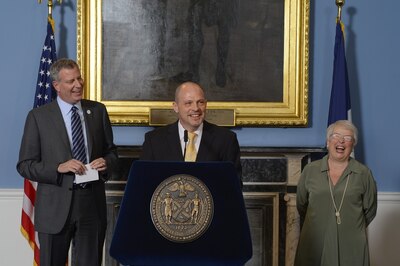The proposed teachers contract would cost the city at least $6 billion and impact tens of thousands of educators. But a provision that involves no new funding and covers only a fraction of schools is one officials say could transform the school system.
The plan would let educators at up to 200 schools design and carry out experiments in school improvement: from lengthening the school day to swapping out tests for projects to having teachers help evaluate their peers. In an echo of the charter-school model, those schools would be released from certain contract rules but held accountable to new performance targets, all while acting as innovation incubators for the rest of the school system, city and union officials said.
That has worried some union members who fear the proposal would weaken protections for teachers and send the message that union contracts inhibit innovation. Meanwhile, union critics claim the plan will not loosen contract rules enough to foster successful charter school-style experimentation.
Even proponents of the plan have raised questions about it: Without funding for the program, how will the city help schools make big changes? And will the initiative spark new innovation, or simply spotlight schools that are already experimenting?
“I’m not sure I totally understand the incentive,” said a middle school principal who spoke on the condition of anonymity, adding that he still plans to apply to the program. “I don’t know if it will be worth it, but I’m definitely going to try.”
The plan, called Progressive Redesign Opportunity Schools for Excellence, or PROSE, will go into effect if union members ratify the proposed teachers contract. It would allow schools to alter their schedules, class sizes, student assessments, teacher evaluations, and more.
According to the city-union contract agreement, a mix of low and high-performing schools will be encouraged to propose such changes. Teachers and administrators must develop the proposals together, and parent leaders must sign off on them. If a joint Department of Education-United Federation of Teachers panel approves a proposal and 65 percent of a school’s unionized staff ratifies it, then the school will be freed from any rules that would restrict the proposed changes.
“The last thing that should happen,” Mayor Bill de Blasio said when the deal was announced, “is to have either the chancellor’s regulations or UFT work rules stand in the way of innovation that everyone agrees on.”
The program would save schools that already bend the contract rules from having to do so in secret or having to vote on annual contract modifications known as School-Based Options, or SBOs, union officials noted. The new program would also allow schools to propose changes that are not permitted by SBOs, such as longer school days or peer evaluations. And while SBOs last for one year, schools would remain in the PROSE program for five years, unless the authorizing panel decides a school “is not succeeding,” the agreement says.
“I took the SBO idea and I said, ‘Let’s amp it up,'” UFT President Michael Mulgrew told Chalkbeat.
Still, debate has broken out about whether PROSE would give schools too much leeway to experiment or not enough.
Department of Education officials have emphasized that there are “no limits” to the changes that schools can propose. But in a recording obtained by Chalkbeat, Mulgrew told teachers at a closed-door meeting that the union would not allow schools to do away with seniority protections for teachers or to alter the union’s salary system, which bases pay on experience and education.
Jenny Sedlis, executive director of StudentsFirstNY, an advocacy group that frequently criticizes the teachers union, said it’s clear that schools in the program will have less “freedom to innovate” than charter schools, most of which are not bound by the city-union contract. In particular, she questioned whether schools would be permitted to adjust how teachers are paid or fired, among other changes.
“The greatest levers you have to make change in a school will not be on the table,” she said.
But some teachers said they worry the program could serve as an end run around contract protections for teachers, and that PROSE schools could come to resemble charter schools.
Tina Collins, a UFT official who researches charter schools for the union, will help run the PROSE program for the union. But Mulgrew called any suggestion that the program will turn traditional schools into charters “bogus,” and noted that schools have long been offered contract flexibility through SBOs.
Other teachers questioned why more school-level experimentation is necessary when there is already wide agreement within schools that certain policy changes, such as smaller class sizes and more robust social services, would benefit students.
“There are plenty of things we know work for kids,” said Julie Cavanagh, a teacher at Brooklyn’s P.S. 15 who has been critical of the proposed contract. “Why aren’t we doing those things?”
Even as debate over the plan continues, officials are already identifying possible PROSE schools.
The contract deal sets a goal of establishing 200 such schools over the next five years. In order to give schools time to plan over the summer, officials want teachers in the first batch of PROSE schools to vote on their proposals by the end of June — just weeks after the contract is expected to be ratified.

The union has already started reaching out to schools it thinks may be interested. This week, union officials met with teachers from a group of schools that substitute performance-based assessments for most standardized tests.
Meanwhile, several school leaders who have reviewed the PROSE plan said they found it appealing, since it would provide some stability as they continue to experiment. But it remains to be seen whether the program will attract schools that have not already started to make changes.
Nigel Pugh, principal of Manhattan’s Richard R. Green High School of Teaching, said he liked the PROSE idea, especially its call for teacher-administrator collaboration. But he said that he would hesitate to propose a major change, such as a longer school day, when teachers are still adjusting to new standards, special-education reforms, and evaluations.
“There’s a limit to how much you can ask them to do,” he said.
It is also unclear what type of technical and financial support PROSE schools will receive to help them enact their plans.
Schools will be able to request extra funding, but none is guaranteed, according to the agreement. The mayor also did not set aside any money for the program in his budget proposal, though union officials said the city could seek state or federal funding.
Both city and union officials have promised that the schools will receive support based on their particular needs, but offered few specifics. Schools making similar changes may be able to pool resources or share best practices, union officials said.
What is clear is that schools tend to require intensive assistance when making big changes.
The Bronx Writing Academy, or P.S. 323, created staggered start times for teachers, adjusted the lengths of classes, and incorporated online learning through the city’s iZone program over the last few years. IZone paid for new computers and Internet infrastructure for the school, and connected it with at least three other groups that helped it plot out the changes, said principal Kamar Samuels.
“We had a lot of support around how to manage change and innovation,” Samuels said. “I think that will be a real key piece of PROSE.”


